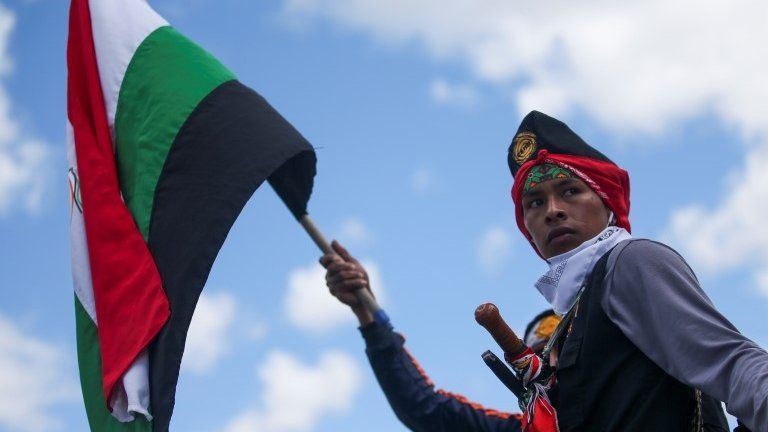Colombia protests resume after talks flounder
- Published

Trade unions, student and indigenous groups are marching in Colombia's major cities to increase the pressure on the government of President Iván Duque.
The protests started almost two weeks ago with hundreds of thousands of people taking part in rallies.
The demands of those demonstrating are wide-ranging and include making access to education more accessible.
The two sides are due to meet again on Thursday but so far little progress has been made in talks between them.
'They keep killing us'
The committee representing the protesters has handed President Duque a list of 13 demands. Among them are that the government fully meet its obligations under the terms of the peace process signed with the left-wing rebels of the Farc in 2016, and that it do more to prevent the killings of social activists and former rebels.
Some of the protesters accuse President Duque, who opposed the peace agreement, of trying to undermine it.
The committee also wants assurances that the pension age will not be raised and that the minimum wage will not be cut for young people. President Duque denies having plans to change either and says the protesters are being manipulated by his political rivals.
Following the death of one young protester after he was hit by a projectile fired by riot police, the committee is also calling for that force to be dismantled. Eighteen-year-old Dilan Cruz died after he was hit on the head by a beanbag round, a fabric sack filled with lead shot.
President Duque has ruled out disbanding the riot police force.
He has also called for a "great national dialogue" to discuss the protesters' demands, but the committee behind the protests has demanded that the talks be solely between it and the government as it fears having other groups represented would "water them down".
On Wednesday, indigenous groups again joined in the protests in the capital, Bogotá. Indigenous rights group Onic says more than 100 indigenous people have been killed since President Duque took office, many of them are targeted by paramilitary groups and drug gangs who operate on their land.
"They can't keep killing us!" they shouted.
- Published26 November 2019
- Published23 November 2019
- Published23 November 2019
- Published22 November 2019
- Published30 October 2019